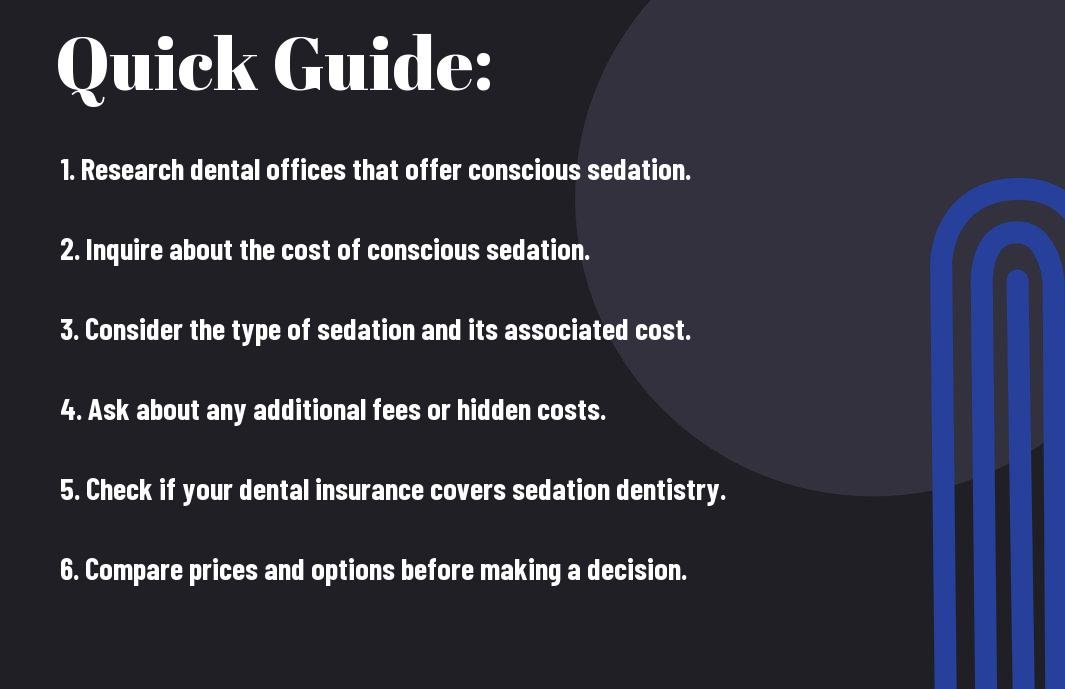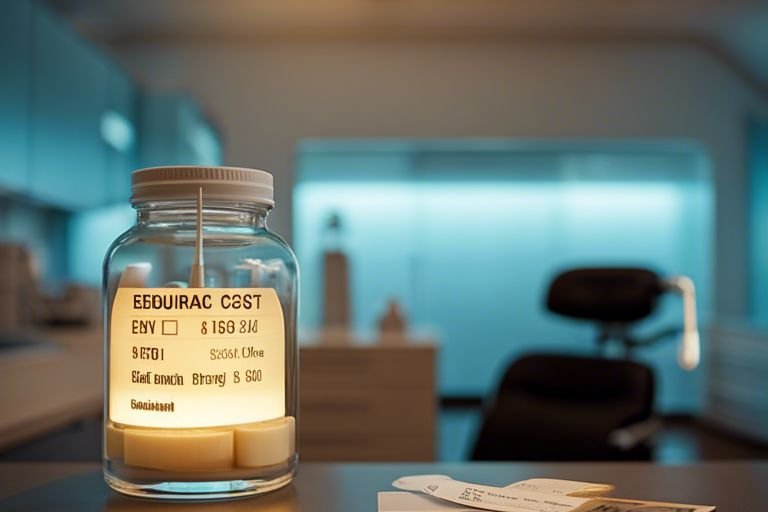Indubitably, conscious sedation can be a life-changing solution for those who fear the dentist chair; however, the cost can be a significant factor to consider. As someone who has had personal experience with conscious sedation dentistry, I understand the importance of knowing the factors and options that can affect the cost of this procedure. In this guide, I will walk you through the various factors that can impact the cost of conscious sedation, as well as the different options available to you. Understanding these details will empower you to make the best decision for your dental health while also managing the financial aspect of your treatment. Whether you are considering conscious sedation for a routine procedure or a more extensive treatment, it is essential to be well-informed about the cost and options available to you.
Key Takeaways:
- Factors that impact cost: The price of conscious sedation in dentistry varies based on factors such as the type of sedation used, the duration of the procedure, the dentist’s experience, and the location of the practice.
- Types of conscious sedation options: Patients have the option of choosing from various types of conscious sedation, including oral sedation, nitrous oxide, and IV sedation, each of which may have different cost implications.
- Insurance coverage: Some dental insurance plans may cover a portion of the cost of conscious sedation, while others may not. It’s important for patients to check with their insurance provider to understand their coverage options.
- Additional fees to consider: In addition to the sedation itself, patients should consider any additional fees for pre-sedation consultations, monitoring equipment, and post-sedation care, which can impact the overall cost of the procedure.
- Benefits of conscious sedation: Despite the cost considerations, the benefits of conscious sedation in reducing patient anxiety, discomfort, and fear of dental procedures can outweigh the financial investment for many individuals.
Types of Conscious Sedation
The options for conscious sedation in dentistry include:
| Oral Sedation | Administered through a pill or liquid medication, taken by mouth. |
| Inhalation Sedation | Also known as laughing gas, is administered through a mask that you wear over your nose. |
| IV Sedation | Administered through a vein, allowing the medication to work quickly. |
Recognizing the right type of sedation for your dental procedure is essential for a comfortable and stress-free experience.
Oral Sedation
Oral sedation is a popular option for patients who experience mild to moderate anxiety before a dental procedure. The medication is typically taken about an hour before the appointment, allowing it to take effect by the time you arrive at the dental office. Your dentist will prescribe the appropriate dosage based on your medical history and the complexity of the dental work. While oral sedation can help you relax, you will remain conscious throughout the procedure.
Inhalation Sedation
Inhalation sedation, also known as nitrous oxide or laughing gas, is a safe and effective option for managing dental anxiety. It is administered through a mask that you wear over your nose, allowing you to breathe in a combination of nitrous oxide and oxygen. The effects of inhalation sedation are quick, and it wears off rapidly after the mask is removed, allowing you to resume your daily activities without any lingering drowsiness.
IV Sedation
IV sedation, or intravenous sedation, involves administering the sedative medication through a vein. This method allows the medication to take effect quickly, and your dentist can adjust the dosage as needed to ensure your comfort throughout the procedure. While under IV sedation, you will be in a semi-conscious state, aware of your surroundings but deeply relaxed. This type of sedation is often used for more complex dental procedures or for patients with severe anxiety.
Factors Influencing the Cost of Conscious Sedation
Complexity of the Procedure
One of the major factors that influence the cost of conscious sedation is the complexity of the dental procedure. More complex procedures typically require a higher level of sedation, which can increase the overall cost. Additionally, procedures that require more time to complete may also result in higher sedation costs. Any additional procedures or treatments required during the appointment can also impact the overall cost of sedation.
Location of the Dental Practice
When it comes to the cost of conscious sedation, the location of the dental practice can also play a significant role. Dental practices located in urban areas or in areas with a higher cost of living may have higher fees for sedation. On the other hand, practices in more rural areas or regions with lower living costs may offer more affordable sedation options. It’s important to consider the location of the practice when budgeting for conscious sedation.
Experience and Qualifications of the Sedation Dentist
Another important factor to consider when determining the cost of conscious sedation is the experience and qualifications of the sedation dentist. Dentists with advanced training in sedation techniques may charge higher fees for their expertise. However, choosing a highly qualified sedation dentist can provide added peace of mind and potentially reduce the risk of complications. It’s essential to weigh the cost of sedation against the experience and qualifications of the dentist performing the procedure.
Tips for Managing the Cost of Conscious Sedation
For those considering conscious sedation for their dental procedures, managing the cost can be a concern. Here are some tips to help you manage the cost of conscious sedation in dentistry:
- Ask your dentist about the different conscious sedation options available and their costs.
- Check with your insurance provider to see if they cover conscious sedation for dental procedures.
- Discuss financing options with your dental practice if you’re concerned about the cost.
- Choose a dental practice that offers transparent pricing for their conscious sedation services.
Though the cost of conscious sedation can be a factor, it’s important to prioritize your comfort and well-being during dental procedures.
Inquiring About Insurance Coverage
When considering conscious sedation for a dental procedure, it’s important to inquire about your insurance coverage. Some dental insurance plans may cover conscious sedation for certain procedures, while others may not. Before scheduling your procedure, it’s essential to check with your insurance provider to understand what portion of the cost, if any, will be covered.
Exploring Financing Options
If you’re concerned about managing the cost of conscious sedation for your dental procedure, exploring financing options with your dental practice can be beneficial. Some dental practices offer payment plans or financing options to help patients manage the cost of conscious sedation. Discussing these options with your dentist can help alleviate financial concerns and make the procedure more accessible.
Choosing a Dental Practice with Transparent Pricing
When considering conscious sedation for a dental procedure, it’s important to choose a dental practice that offers transparent pricing. This means clearly outlining the cost of conscious sedation and any additional fees associated with the procedure upfront. Transparent pricing allows you to understand the financial commitment involved in your dental procedure and avoid any unexpected costs.
Pros and Cons of Conscious Sedation in Dentistry
Despite the many benefits of conscious sedation in dentistry, there are also potential drawbacks to consider. It’s important to weigh the pros and cons before making a decision about whether conscious sedation is right for you.
| Pros | Cons |
| Relaxation and anxiety reduction | Potential for allergic reactions or side effects |
| Increased pain tolerance | Risk of over-sedation or complications |
| Ability to undergo longer procedures | Cost of sedation may not be covered by insurance |
| Minimal memory of the procedure | Recovery time and potential for grogginess |
| Reduced fear and phobia of dental visits | Not suitable for everyone, such as pregnant women |
Benefits of Conscious Sedation
Conscious sedation can offer a range of benefits, including relaxation and anxiety reduction, increased pain tolerance, and the ability to undergo longer procedures without discomfort. It can also provide minimal memory of the procedure, reducing fear and phobia of dental visits.
Drawbacks of Conscious Sedation
Despite its benefits, conscious sedation also comes with potential drawbacks. These may include the risk of allergic reactions or side effects, as well as the possibility of over-sedation or complications. Additionally, there is a cost associated with sedation that may not be covered by insurance, and some individuals may experience recovery time and grogginess after the procedure.
It’s important to carefully consider these factors and consult with your dentist to determine if conscious sedation is the right choice for your dental care needs.

To wrap up
In conclusion, the cost of conscious sedation for your dental procedures can vary depending on several factors such as the type of sedation, the complexity of the procedure, and your location. It is important to discuss your options with your dentist to find the most suitable and cost-effective option for you. Additionally, be sure to check with your insurance provider to see if they cover any portion of the sedation costs. Whatever the case may be, the benefits of conscious sedation in ensuring comfort and relaxation during your dental visit can make the cost well worth it. Ultimately, the decision on whether to opt for conscious sedation during your dental procedure should be based on your individual needs, so be sure to consider all factors and weigh your options before making a decision.
FAQ
Q: What is conscious sedation and how is it used in dentistry?
A: Conscious sedation is a type of sedation that allows patients to remain awake and aware during dental procedures, but in a relaxed and drowsy state. It is often used for patients who experience anxiety or fear during dental visits or for those undergoing lengthy or uncomfortable procedures.
Q: What factors determine the cost of conscious sedation in dentistry?
A: The cost of conscious sedation in dentistry can depend on several factors including the type of sedation used, the length and complexity of the procedure, the expertise of the dental team administering the sedation, and the geographic location of the dental practice.
Q: What are the options for conscious sedation in dentistry?
A: The options for conscious sedation in dentistry may include oral sedation (taking medication by mouth), inhalation sedation (using nitrous oxide or “laughing gas”), or intravenous sedation (administered through a vein). The choice of sedation option depends on the patient’s needs and the recommendation of the dentist or oral surgeon.
Q: Will my insurance cover the cost of conscious sedation in dentistry?
A: Some dental insurance plans may cover a portion of the cost of conscious sedation, depending on the specific procedures being performed and the details of the insurance plan. It is important to check with your insurance provider to understand the coverage and any potential out-of-pocket costs.
Q: Is conscious sedation in dentistry safe?
A: When administered by a qualified and experienced dental professional, conscious sedation is generally considered safe. However, it is important for patients to disclose their complete medical history and any current medications or supplements to ensure the safety and effectiveness of the sedation. Patients should also be monitored closely during and after the procedure to ensure their well-being.

